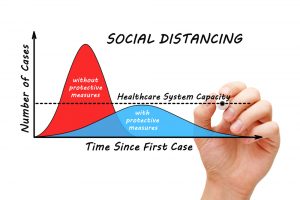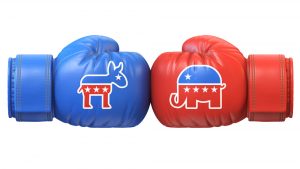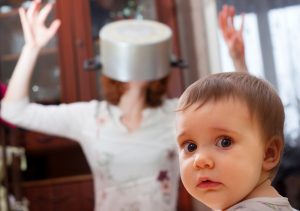Lessons Learned From the Pandemic: Part 1

Ever since I heard the story of John Snow and his discovery of the source of cholera over 2 decades ago, I’ve been fascinated by how epidemiologists fight epidemics. There are clear patterns and standard protocols that they use to fight infectious disease, and familiar trends with how the public responds.
The standard protocols and our response make sense, if you know the patterns.
At the same time, through my own journey of trauma and recovery, I’ve come to a stage called post traumatic growth. In the stage of post traumatic growth, you become grateful for the past, regardless of how horrific it was, because it’s taught you a lesson. Your pain, and your journey through it, gives you meaning, as it drives you to find a way to protect others who are vulnerable.
Thus, when unspeakable tragedy hits our country, I often wonder if there’s a lesson we are being called to learn.
Because one of my passions is to understand how we can thrive as a society, the answers came to me swiftly. I came up with 9 lessons that I believe will help make us a happier, healthier and a more resilient country. And they are important lessons we need to learn to effectively fight pandemics.
This is my first article in my 9-part series:
Lessons learned from the pandemic
Lesson #1: We need to learn who to trust.
With the breakdown of laws that required journalists to tell the truth, and with the openness of the internet, its tough to know who to trust.
This is an especially salient issue in the midst of a pandemic. It’s imperative to understand what sources we can trust.
How can we determine who to trust?
-
) Use their history to determine their motive
One of first things I look for is motive. And as many of us do, I base motive on a person’s history.
Since there are many that believe Bill Gates has nefarious intentions, let’s use him as an example.
Bill Gates was the founder of Microsoft. The company has been wildly successful, and he amassed a tremendous amount of wealth in the process.
Then he met Melinda and together they founded the Gates Foundation. Since their inception, they’ve given out over 50 billion dollars of funding to organizations who are in alignment with their mission.
What is their mission? As their website says:
I’ve visited the Gates Foundation Discovery Center. Their museum features an impressive number of public health projects funded all over the world. And they’ve clearly improved the lives of millions through their efforts.

You get to choose what matters to you at the Gates Foundation Discovery Center
So the accusations don’t add up.
Questions I’ve asked myself to determine whether he’s trust worthy include:
What would Bill Gate’s motive be to kill people through vaccines?
Why would he want to do something so out of alignment with who he perceives himself to be?
Why would he try to find a devious way to kill people, when he’s dedicated so much of his time, effort and money into helping people thrive?
What would he stand to gain from killing people?
Does he have a history of mental instability or sociopathy?
And if these accusations were true, why aren’t employees defecting?
Why is he still able to hire people who are passionate about public health?
And if his intentions were questionable, why wouldn’t there be more leaks from inside sources?
-
Do they have the expertise to be a credible source?
There is a misunderstanding that because doctors are the public face of health that they would have the expertise to make effective decisions about what we should be doing as a nation.
But there’s a key difference between those that have an expertise helping individuals vs. those that study patterns across populations.
Both financial advisors and doctors have expertise in helping the individual solving their personal problems.
Does this mean that a financial advisor should be advising a head state of how to recover from an economic melt down?
No.
Economists look at larger trends, and they have models they can use to make educated guesses about specific interventions. This is their expertise.
And does this mean that an individual healthcare practitioner should be advising us about how to end a pandemic?
No.
Epidemiologists look at larger trends, and they have models they can use to make educated guesses about specific interventions. This is their expertise.

Epidemiologists look at the relationship between our collective behavior and the spread of disease
Economics and Epidemiologists/public health experts are experts in looking at how specific variables (like viruses) affect societies. When we are looking for experts to advise us in a pandemic, the 1st people I will turn to is people with expertise in infectious disease epidemiology.
That being said, the best outcomes will be found by communities of public health experts who are collaborating across different disciplines. For example, Johns Hopkins has redirected its efforts to solving problems with COVID-19. They have 260 scientists working on 25 interdisplinary projects.
As for finding a cure? That is the job of medical and health professionals and researchers with expertise in immunology and virology. And since this virus affects other systems in the body, researchers with a variety of expertise should weigh in on the subject. I also the value the view of alternative care providers who have the education and experience necessary to treat infectious diseases.
-
) We need to know how our ability to trust is shaped:
There are 4 major factors that shape our ability to trust:
1.) Our leaders, our news media and our institutions.
Too many have lost our trust, and trust in America is declining.
Liberals don’t trust conservatives, and conservatives don’t trust liberals. And many progressive liberals have lost trust of the Democratic party.
2.) Our culture
For example with government restrictions or a vaccine, we are more likely see to widespread objections in cultures that are individualist (vs collectivist), and in cultures that are considered loose (rule breakers) vs. cultures that are tight (rule makers). These cultural norms shape what we value and how we think.
 Our beliefs are also shaped by our tribes. We often short cut decisions about who we should trust based on whether we consider them a part of our tribe. This is especially salient right now with the divisions between our 2 main political parties. When we identify with one party over the other, our default state is to only trust the party we identify with.
Our beliefs are also shaped by our tribes. We often short cut decisions about who we should trust based on whether we consider them a part of our tribe. This is especially salient right now with the divisions between our 2 main political parties. When we identify with one party over the other, our default state is to only trust the party we identify with.
Our culture also values people who fall into particular stereotypes. Even though women have surpassed men in educational attainment, white men are still seen as the most credible and knowledgeable. It takes awareness of our biases, and then a conscious effort to overcome them.
3.) Our knowledge
Whenever there is an epidemic, there are always people who object to restrictions and vaccines and who express their right to their freedom. This regularly happened through our history, and most other countries.
But few people know the true history of vaccines. They were developed as a safer alternative to variolations. Variolations were developed by mothers who used it to prevent their children from developing Smallpox.
Most people don’t know that many infectious diseases have been eradicated thanks to vaccines. While some are afraid of vaccines, before their development, many more people were afraid of catching the latest disease.
Our lack of experience and understanding of science is also interfering with many from trusting it. There’s an expectation that science shouldn’t be so messy. Science has lost the public trust because of its inconsistent findings. But there are so many variables that determine outcomes, and we are constantly finding more of them. Science is a work in progress, and without knowing all the factors involved, results from science will continue to be messy. It doesn’t mean that it isn’t valuable. It is limited by our biases and what we know, and that is always evolving.
As eloquently stated in the article “Why the Coronavirus is So Confusing” in The Atlantic by Ed Young:
4.) Our mental state
Many of us are living in fear of tremendous loss, whether its from the virus, being able to provide for our families, or both. For too many of us, these restrictions interfere with our ability to pay our bills, and put us in a state of tremendous economic insecurity.
This the kind of extreme stress that clouds our ability to make wise decisions.
When we are threatened, we lose our ability to be rational. It makes a part of our prefrontal cortex go “off-line”, which inhibits our internal adult. Thus we are more likely to support those that confirm our theories, rather than being able to see the big picture.
This is why our culture is ripe for conspiracy theories.
So in evaluating who to trust, we have to think about their motives. If someone is being accused of something, does it match their reputation? Would it match their internal sense of who they are? What motive would they have and would they stand to gain?
Then we need to know who has the education and expertise to trust. I hope you now have a better understanding of what various experts are trained to do.
And finally we have to know what influences our ability to trust, including how our culture and our mental state affect our ability to trust.
Because trust is so fundamental our recovery from this pandemic, I’m going to elaborate in my next article about the drastic contrasts between what happens to societies with governments and leaders that are trust-worthy, vs. those who are not.
Do you like this article? Please use the social media buttons below to share!




A sane and reasonable post. Thank you
Thank you Ann!